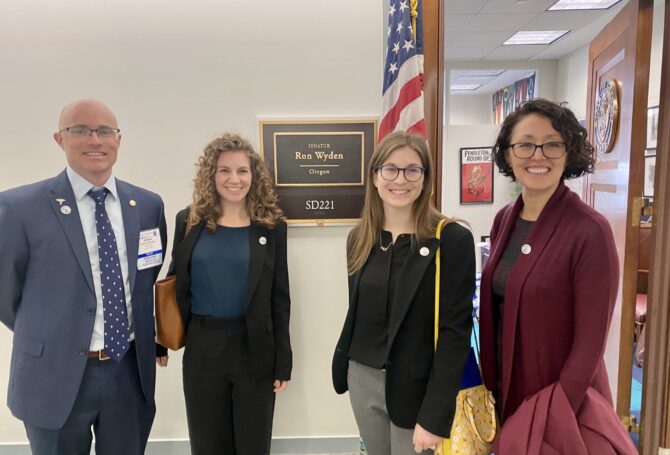July 23, 2019
OPS advanced several priority bills and initiatives during the recent 2019 Oregon Legislative Session. Of the 2,768 bills introduced, OPS’s lobbyist Katy King and our Advocacy Committee tracked 23 priority-one and 47 priority-two bills. Katy reports on some of the OPS priority bills:
- House Bill 2005 Paid Family and Medical Leave PASSED. Creates an insurance program giving every Oregon worker 12 weeks of paid leave for welcoming a new child, serious personal or family illness, and sexual or domestic violence issues.
- HB 2270 PASSED. Referral to the 2020 November ballot to raise the tobacco tax by $2 per-pack and to create a new e-cigarette and a vaping product tax. This would raise $346 million with 90 percent allocated to fund the Oregon Health Plan and 10 percent for the tobacco prevention and education program.
- HB 2563 on Newborn Screening Rules PASSED. OPS advocacy gave pediatricians two seats on the advisory board.

OPS Lobby Day at the Capitol on 2-27-19.
- HB 3273 Medication Take-Back Program PASSED. Provides easier ways to get rid of excess pharmaceuticals.
- HB 3427, the Student Success investment package, PASSED. It brings record investments in early learning and behavioral health services in schools.
- Senate Bill 52 “Adi’s Act” PASSED. Requires school districts to develop plans to prevent youth suicide.
- SB 526 Universally Offered Nurse Home Visiting PASSED. Will offer public health nurse home visits to families of newborns in the first weeks of life. Duke University’s Family Connects model and other programs provide program support.
- The Oregon Reach Out and Read program’s Department of Education budget was increased from $50,000 to $75,000 for the biennium.
In the loss column:
- HB 3063, the bill to eliminate non-medical exemptions for school entry requirements and HB 978, the omnibus gun violence prevention bill were traded by the governor in negotiations to end the first Senate Republican walkout.
- HB 2505, a safe storage for guns bill, died in the House Rules Committee.
- SB 765, a primary care payment reform championed by the Oregon Academy of Family Physicians and Children’s Health Alliance, and supported by OPS, died in committee.
Of note:
SB 770 Health Care for All Oregonians, which establishes a taskforce to design a universal health care program, passed. OPS will monitor the work of this group and provide education for members.
The 2019 Oregon Legislative Session Overview
The 82nd Legislative Assembly convened on January 22 and adjourned on June 30, six and a half hours ahead of the midnight constitutional deadline. Democrats held super majorities in the Senate (18-12) and in the House (38-22) but Senate Republican walkouts and the House practice of requiring all bills be read in their entirety, led to one of the most contentious sessions in decades. The first walkout, which lasted four days, was to protest House Bill 3427, the Student Success investment package and the $2 billion tax to pay for it. Gov. Kate Brown negotiated the return of the Republicans and the path forward for HB 3427 by trading away a hard-fought vaccine bill and an omnibus gun bill, a priority for Democrats. Republican senators walked out the second time over HB 2020, a sweeping cap-and-trade bill, that ultimately failed. More than 140 bills, including the Oregon Health Authority (OHA) budget and the $2 per-pack tobacco tax referral to voters, were left in limbo until the Republicans returned nine days later — just two days before adjournment. The rhetoric was heated and one lawmaker faced a hearing before the Senate Special Committee on Conduct for statements that appeared to threaten the state police who were charged by the governor to round up the missing legislators.
The Democratic supermajorities still allowed them to pass a new corporate business tax of $2 billion to fund the education package, as well as bills on universally offered nurse home visiting for newborns, paid family medical leave, rent control, a tobacco tax referral to the 2020 ballot, and juvenile justice reform, which end automatic referral of juveniles to adult court. If if this was the most contentious session in decades, HB 3063, the bill to remove non-medical exemptions for school-entry requirements, was the most inflammatory issue. This bipartisan bill sponsored by Rep. Mitch Greenlick, D-Portland, Rep. Cheri Helt, R-Bend, and Sen. Chuck Thomsen, R-Hood River and others, was backed by a large health provider coalition that included OPS, the Children’s Health Alliance, the Oregon Chapter of the American College of Emergency Physicians, and the Oregon Psychiatric Physicians Association.
Despite this concerted effort by health advocates, opponents to the non-medical vaccine exemption repeal bill were able to rally thousands to the Capitol for protests, swamping legislators with calls and e-mails, and showing up in large numbers for hearings. Over 2,000 letters were submitted for the record at the two hearings. However, the public health policy and evidence-based arguments by medical experts and advocates held sway, passing the House by 35-25. The bill reportedly had the votes to pass the Senate before the governor traded it to end the first Republican walkout.



